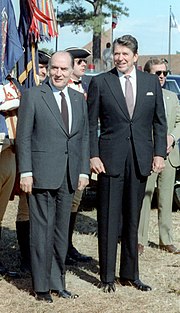Usuario:NACLE/taller2
De Gaulle
[editar]En los años 1950 Francia pidió ayuda a Estados Unidos para desarrollar su propio armamento nuclear. Eisenhower rechazó esas pretensiones por varias razones. Temía de la inestabilidad política de la Cuarta República Francesa y le preocupaba que pudiera usar armamento nuclear en las guerras coloniales francesas como Vietnam o Argelia. Charles de Gaulle trajo estabilidad a la nueva Quinta República que comenzó en 1958, aún así Eisenhower desconfiaba de ayudar a conseguir armamento atómico a los franceses. De Gaulle pretendía desafiar el monopolio anglosajón con el uso propio de su propia fuerza de ataque nuclear conocida como Force de frappe. Eisenhower temía que los planes de convertir en una potencia nuclear a Francia debilitarían a la incipiente OTAN. Y la razón que radica en el fondo, Washington prefería que no existiera una proliferación de armas de nuclear en ningún sitio.[1]
Además De Gaulle no apoyaba la entrada de Gran Bretaña en la Comunidad Económica Europea. Estas y otras tensiones llevaron al gobierno de París en 1966 a retirar sus tropas de la estructura militar integrada en la Organización del Tratado del Atlántico Norte y forzó a la organización a trasladar sus cuarteles generales a Bélgica (donde siguen estando en la actualidad). La política exterior francesa se centró en intentar limitar el poder y la influencia de ambas superpotencias, aumentando el prestigio y la presencia internacional francesa en términos relativos. De Gaulle esperaba mover a Francia de su posición de aliada-seguidora de Estados Unidos a potencia de primer orden mundial y voz de los países no alineados en el Tercer Mundo. Las naciones que De Gaulle consideraba potenciales
DeGaulle also quarreled with Washington over the admission of Britain into the European Economic Community. These and other tensions led to de Gaulle's decision in 1966 to withdraw French forces from the integrated military structure of the North Atlantic Treaty Organisation and forced it to move its headquarters to Belgium. De Gaulle's foreign policy was centered on an attempt to limit the power and influence of both superpowers, which would increase France's international prestige in relative terms. De Gaulle hoped to move France from being a follower of the United States to a leading first-world power with a large following among certain non-aligned Third World countries. The nations de Gaulle considered potential participants in this grouping were those in France's traditional spheres of influence, Africa and the Middle East.[2]
The two nations differed over the waging of the Vietnam War, in part because French leaders were convinced that the United States could not win. The recent French experience with the Algerian War of Independence was that it was impossible, in the long run, for a democracy to impose by force a government over a foreign population without considerable manpower and probably the use of unacceptable methods such as torture. The French popular view of the United States worsened at the same period, as it came to be seen as an imperialist power.[3][4]
1970–1989
[editar]
Relations improved somewhat after de Gaulle lost power in 1969. Small tensions reappeared intermittently. France, more strongly than any other nation, has seen the European Union as a method of counterbalancing American power, and thus works towards such ends as having the Euro challenge the preeminent position of the United States dollar in global trade and developing a European defense initiative as an alternative to NATO. Overall, the United States had much closer relations with the other large European powers, Great Britain, Germany and Italy. In the 1980s the two nations cooperated on some international matters but disagreed sharply on others, such as Operation El Dorado Canyon and the desirability of a reunified Germany. The Reagan administration did its best efforts to prevent France and other European countries from buying natural gas from Russia, through the construction of the Siberia-Europe pipeline. The European governments, including the French, were undeterred and the pipeline was finally built.[5]
- ↑ Keith W. Baum, "Two's Company, Three's a Crowd: The Eisenhower Administration, France, and Nuclear Weapons." Presidential Studies Quarterly 20#2 (1990): 315-328. in JSTOR
- ↑ Robert O. Paxton and Nicholas Wahl, eds. De Gaulle and the United States: a centennial reappraisal (Berg Publishers, 1994).
- ↑ Yuko Torikata, "Reexamining de Gaulle's peace initiative on the Vietnam War." Diplomatic History 31.5 (2007): 909-938.
- ↑ Marianna P. Sullivan, France's Vietnam policy: a study in French-American relations (1978).
- ↑ Philip Zelikow and Condoleezza Rice, eds., Germany unified and Europe transformed: a study in statecraft (Harvard UP, 1995).
